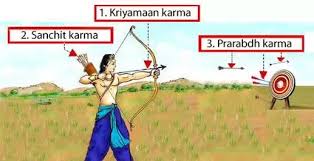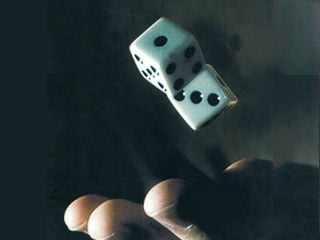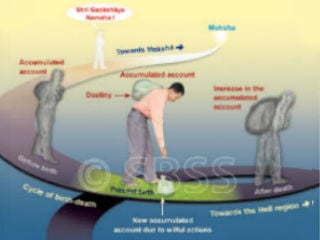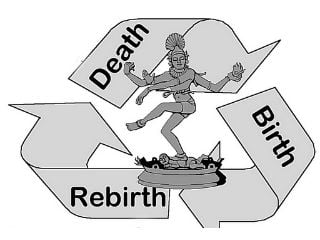Karma (An act or action which gives rise to destiny) that we do according to our intellect or will is called the kriyaman-karma. Day-to-day and occasional karma performed by an individual is called ‘kriyaman-karma’. Of the total karmas that the human beings perform, 35% are done because of kriyaman-karma. Of the entire kriyaman-karma, 90% of the karma is done to fulfill his own desire, while only 10% is done out of parechha (Others’ wish). Kriyaman-karma falls within the domain of human intelligence. Therefore, performing it correctly or otherwise solely depends on the reflex action originating from the subconscious impressions in the mind of the individual. Since kriyaman-karma is associated with Dnyan-shakti (Energy of Knowledge), it is said that if it is done in an appropriate manner, one can overcome prarabdha-karma. Therefore, kriyaman-karma carries immense importance. That is the reason why Saints insist on excellence in kriyaman-karma.

1. Without activity, nothing can be achieved
A. पश्य कर्मवशात् प्राप्तं भोज्यकालेऽपि भोजनम् ।
हस्तोद्यमं विना वक्त्रे प्रविशेत् न कथंचन ।।
Meaning : Destiny may provide a meal during the meal hours, yet without the movement of the hands, the food will not enter the mouth.
B. Is it not possible to live by swallowing merely air without eating food ? If it is possible then why make the effort ? This statement is also not correct; because, even if an individual survives for some time without food and water, he still has to continue to breathe. Without breathing, it is impossible for man to survive. Procuring food, eating, and living are acts achieved through effort; hence, man should always keep trying.
C. Question : ‘Who renounces desire, the believer in destiny or the believer in effort ?’
Srī Gulabrao Maharaj : Both, believers in destiny as well as believers in effort, renounce desires; but the believers in destiny lie like a corpse (lie down without performing any activity) and the believers in effort work like a machine without any expectation. In my opinion, true renouncing of desires can be done only by believers in effort; because believers in destiny desire something, but because of laziness, are not inclined to do sadhana (Spiritual practice)’.
2. Fate cannot succeed without efforts
A. यथा बीजं विना क्षेत्रमुप्तं भवति निष्फलम् ।
तथा पुरुषकारेण विना दैवं न सिध्यति ।। – Mahabharat, 13.6.7
Meaning : If a seed is planted without first preparing the field, the seed is wasted. Similarly, without activity, only through destiny, a task cannot be accomplished.
B. यत्नो हि सततं कार्यस्ततो दैवेन सिध्यति ।। – Mahabharat, 12.153.50
Meaning : Always keep trying, so that, by chance, you will succeed.
C. उद्यमेन हि सिध्यन्ति कार्याणि न मनोरथैः ।
न हि सुप्तस्य सिंहस्य प्रविशन्ति मुखे मृगाः ।। – Panchtantra, 58.5.286-287
Meaning : Pre-planned tasks (of human beings) are completed through hard work alone, and not merely by desires. Deer do not (automatically) come and fall into the mouth of a sleeping lion. (For this, the lion has to make an effort)
D. दैवम् एव इह चेत् कर्तृ पुंसः किम् इव चेष्टया ।
स्नान-दान-आसन-उच्चारान् दैवम् एव करिष्यति ।। – Yogvasishtha, 2.8.6
Meaning : (Sage Vasishtha says to Srīram) ‘If destiny alone is going to do everything in this world, what is the use of man doing any work ? Destiny will do all the work like bathing, donating, sitting, talking.’
Even if the destiny is good, we cannot rely only on it. Without effort, even destiny does not succeed. Moreover, if destiny is not favourable, then even after trying, there is no success; but since putting in efforts is in our hands, we should not shirk from putting in efforts. Then, if destiny is favourable, we will get success. The logic is, even if the farmer’s destiny is good, he cannot reap a harvest without making efforts.
3. Whoever considers only destiny to be superior, perishes
A. उदाराणां तु सत्कर्म दैवं क्लीबा उपासते ।। – Mahabharat, 12.139.82.
Meaning : The superiors trust noble work. The weak rely on destiny.
B. मूढैः प्रकल्पितं दैवं, तत्पराः ते क्षयं गतः । – Yogvasishtha
Meaning : Destiny is the creation of fools out of their own imagination. Whoever considered it superior has perished.
C. असंशयं दैवपरः क्षिप्रमेव विनश्यति ।। – Mahabharat, 12.125.22
Meaning : There is no doubt that the believer of destiny gets completely ruined quickly.
4. Deities too earned superiority through effort
A. उत्थानेनामृतं लब्धमुत्थानेनासुरा हताः ।
उत्थानेन महेन्द्रेण श्रेष्ठ्यं प्राप्तं दिवीह च ।। – Mahabharat, 12.58.14
Meaning : Deities too got the Amrut (Divine nectar) through effort; and through effort alone, they were able to destroy the demons. Indra too was able to rule over this and the nether world only through His effort.
B. न लभन्ते विना उद्योगं जन्तवः संपदां पदम् ।
सुराः क्षीरादविक्षोभम् अनुभूय अमृतं पपुः ।।
Meaning : Without effort, living beings are not eligible to acquire wealth. Only after putting in the effort required for churning the ocean, did the Deities get to drink the Amrut (Nectar).
5. Kriyaman superior to prarabdha
A. No control over prarabdha
We have no control over prarabdha, yet to put in effort (kriyaman-karma) is our duty.
B. Prarabdha is the result of kriyaman-karma
Prarabdha is the result of kriyaman-karma performed in the previous births in the form of merits and demerits; hence, when compared to prarabdha, kriyaman (effort) is superior.
C. Even if the kriyaman-karma is just 1%, it is
possible to overcome 99% prarabdha with the help of sadhana
Some say that the prarabdha-karma makes us dance to its tune like puppets while some say that kriyaman-karma is important. What is the truth then ? In this context, it can be said that in the worldly life of most people in the present era of Kaliyug, the prarabdha-karma and kriyaman-karma carry importance in proportion of 65% and 35% respectively. In case of some, the prarabdha-karma could even be 80 to 90 percent. At the time of first birth of the soul, the prarabdha-karma is 0 percent and kriyaman-karma is 100 percent. In the last birth, at the end of Kaliyug, prarabdha-karma would be 100 percent and kriyaman-karma would be 0 percent. However, it is important to note that even when kriyaman-karma is 1%, the 99% prarabdha can be overcome with the help of sadhana.
D. It is essential to persevere with kriyaman
until the battle between prarabdha and kriyaman is won
When two enemies fight, on some occasions one wins and at other times, the other. In the same way, the destiny and the materialistic efforts battle each other for supremacy. In this battle too naturally, the weaker loses. Till the fruit of karmas of the previous birth is not fully exhausted, man should keep trying.

 Using Kriyaman-karma effectively
Using Kriyaman-karma effectively How to overcome sufferings of Prarabdha
How to overcome sufferings of Prarabdha Facing the consequences of Prarabdha
Facing the consequences of Prarabdha What is Sanchit-karma and Prarabdha?
What is Sanchit-karma and Prarabdha? Kartavya (Duty) karma
Kartavya (Duty) karma Importance of karma
Importance of karma